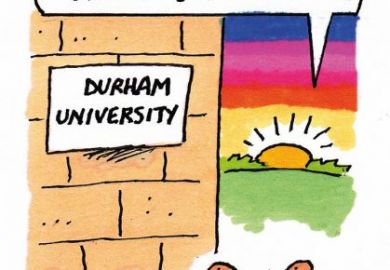
John Lennon derived the line in the Beatles’ A Day in the Life about “4,000 holes in Blackburn, Lancashire” from reading a Daily Mail story – and maybe some aspiring lyricist out will there read the news that “Oxford professor counts 93 penises in Bayeux Tapestry”, related by The Times on 13 July. Size really does matter, according to George Garnett, the University of Oxford medieval history professor who identified 88 equine and five human appendages. Writing in BBC History Magazine, he notes that Harold is depicted “mounted on an exceptionally well-endowed steed”. However, “the largest equine penis by far is that protruding from the horse presented by a groom to a figure who must be Duke William, just prior to the battle of Hastings”. Professor Garnett concludes that “the virility of the two leading protagonists is reflected in that of their respective mounts” and that the presence of penises of “predominantly prodigious dimensions” was among factors intended to make the tapestry “appeal to laymen more than clerics”.
The Sun reported on “research” that looked at “the weekly rent of university hall and meal costs but also crucial students’ expenses such as the price of a pint in Wetherspoon’s or a kebab”. TotallyMoney compared the living costs at the 50 highest-ranked universities in the Sunday Times Good University Guide. “The University of Warwick ranked first as the cheapest university town in the UK for students to live in [the university is in Coventry], with a weekly university hall rent of £72,” The Sun said on 10 July. The Warwick locality “also has the second cheapest kebab at £3.99”. Universities minister Sam Gyimah’s idea of creating a “MoneySuperMarket” guide to higher education institutions has been skewered by many in the sector. But, in introducing the idea of comparing kebab costs by provider, The Sun could be the donor of a meaty metric to the minister’s app.
The Guardian reported on 12 July that, after UCL “advised lecturers to carry out random spot checks on students’ identity documents”, some academics have been warned that they could face fines of £20,000 for failing to report student immigration breaches. An email sent to academics and administrative staff at the Bartlett, UCL’s faculty of the built environment, “warned that a £20,000 fine for failing to report immigration breaches by international students would be deducted from a lecturer’s ‘discretionary account’, which provides financial support to research staff and also covers expenses for conferences, travel and training, purchasing equipment and computers”. One for the higher education pay talks perhaps – how much is a part-time border force officer worth?
“We don’t need every teenager to get a degree”, was the headline from the Daily Mail (which must have missed the latest participation figures) as it reported on Dame Martina Milburn’s pre-appointment hearing with MPs for the job of chairing the government’s Social Mobility Commission. The government had already dropped the no longer palatable term “child poverty” from the commission’s title and was finding a new chair to replace an inconvenient Milburn, former Labour minister Alan, who resigned with a claim that pursuing Brexit left ministers without the necessary “bandwidth” to address social divisions. Dame Martina, chief executive of the Prince’s Trust, now confirmed in her social mobility post, said: “I think there are a lot of kids at the moment being forced down an academic route that doesn’t suit them and actually doesn’t play to their strengths.” She added: “If I’m using a carpenter to build me a new cupboard, I want someone who loves wood and loves what they do and can do it. I don’t really care whether they’ve got a degree or not.” Dame Martina is probably unique in seeing the UK’s skills and vocational education challenge through the lens (or keyhole?) of her new wardrobe.
More interestingly, a “Social Mobility Employer Index” published on 11 July found that growing numbers of major British employers “now conceal the name of prospective employees’ university during the early stages of the application process as they strive to improve the diversity of their workforce”. Times Higher Education’s report said: "Of the more than 100 recruiters who participated in the Social Mobility Employer Index – who collectively employ in excess of 1 million people – one in five said that they removed the name of applicants’ alma maters to avoid this affecting shortlisting decisions...if the trend continues, it could erode prestigious universities’ selling point that they offer a passport to the best-paid professions.” This sounds like progress for employers, who have been outsourcing their recruitment processes to university admissions departments since before outsourcing was invented.
Register to continue
Why register?
- Registration is free and only takes a moment
- Once registered, you can read 3 articles a month
- Sign up for our newsletter
Subscribe
Or subscribe for unlimited access to:
- Unlimited access to news, views, insights & reviews
- Digital editions
- Digital access to THE’s university and college rankings analysis
Already registered or a current subscriber?


